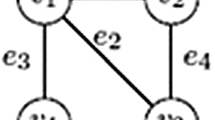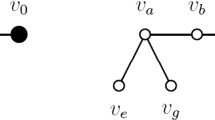Abstract
The satisfiability of a given branching program is to determine whether there exists a consistent path from the root to 1-sink. In a syntactic read-k-times branching program, each variable appears at most k times in any path from the root to a sink. In a preliminary version of this paper, we provide a satisfiability algorithm for syntactic read-k-times branching programs with n variables and m edges that runs in time \(O\left (\text {poly}(n, m^{k^{2}})\cdot 2^{(1-4^{-k-1})n}\right )\). In this paper, we improve the bounds for k = 2. More precisely, we show that the satisfiability of syntactic read-twice branching programs can be solved in time \(O\left (\text {poly}(n, m)\cdot 2^{5n/6}\right )\). Our algorithm is based on the decomposition technique shown by Borodin, Razborov and Smolensky [Computational Complexity, 1993].

Similar content being viewed by others
References
Abboud, A., Hansen, T.D., Williams, V.V., Williams, R.: Simulating branching programs with edit distance and friends: or: a polylog shaved is a lower bound made. In: Proceedings of the 48th Annual ACM SIGACT Symposium on Theory of Computing, STOC, pp. 375–388 (2016)
Barrington, D.A.M.: Bounded-width polynomial-size branching programs recognize exactly those languages in nc1. J. Comput. Syst. Sci. 38(1), 150–164 (1989)
Beame, P., Jayram, T.S., Saks, M.E.: Time-space tradeoffs for branching programs. J. Comput. Syst. Sci. 63(4), 542–572 (2001)
Bollig, B., Sauerhoff, M., Sieling, D., Wegener, I.: Hierarchy theorems for kobdds and kibdds. Theor. Comput. Sci. 205(1-2), 45–60 (1998)
Borodin, A., Razborov, A.A., Smolensky, R.: On lower bounds for read-k-times branching programs. Comput. Complex. 3, 1–18 (1993)
Chen, R., Kabanets, V., Kolokolova, A., Shaltiel, R., Zuckerman, D.: Mining circuit lower bound proofs for meta-algorithms. In: Proceedings of the 21st Annual IEEE Conference on Computational Complexity (CCC), pp. 262–273 (2014)
Cook, S., Edmonds, J., Medabalimi, V., Pitassi, T.: Lower bounds for nondeterministic semantic Read-Once branching programs. In: Proceedings of the 43rd International Colloquium on Automata, Languages, and Programming (ICALP), Leibniz International Proceedings in Informatics (LIPIcs), vol. 55, pp. 36:1–36:13 (2016)
Håstad, J.: Almost optimal lower bounds for small depth circuits. In: Proceedings of the 18th Annual ACM Symposium on Theory of Computing, May 28-30, 1986, Berkeley, California, USA, pp. 6–20 (1986)
Håstad, J.: The shrinkage exponent of de morgan formulas is 2. SIAM J. Comput. 27(1), 48–64 (1998)
Impagliazzo, R., Matthews, W., Paturi, R.: A satisfiability algorithm for AC0 . In: Proceedings of the 23rd Annual ACM-SIAM Symposium on Discrete Algorithms (SODA), pp. 961–972 (2012)
Jukna, S.: A note on read-k times branching programs. ITA 29 (1), 75–83 (1995)
Jukna, S.: A nondeterministic space-time tradeoff for linear codes. Inf. Process. Lett. 109(5), 286–289 (2009)
Nagao, A., Seto, K., Teruyama, J.: A moderately exponential time algorithm for k-IBDD satisfiability. In: Proceedings of Algorithms and Data Structures - 14th International Symposium (WADS), pp. 554–565 (2015)
Paturi, R., Pudlák, P., Zane, F.: Satisfiability coding lemma. Chicago Journal Theoretical Computer Science 1999 (1999)
Santhanam, R.: Fighting perebor: New and improved algorithms for formula and QBF satisfiability. In: Proceedings of the 51th Annual IEEE Symposium on Foundations of Computer Science (FOCS), pp. 183–192 (2010)
Sauerhoff, M.: Lower bounds for randomized read-k-times branching programs. In: Proceedings of the 15th Annual Symposium on Theoretical Aspects of Computer Science (STACS), pp. 105–115 (1998)
Subbotovskaya, B.A.: Realizations of linear functions by formulas using and, or, not. Soviet Mathematics Doklady 2, 110–112 (1961)
Thathachar, J.S.: On separating the read-k-times branching program hierarchy. In: Proceedings of the 30th Annual ACM Symposium on the Theory of Computing (STOC), pp. 653–662 (1998)
Williams, R.: Improving exhaustive search implies superpolynomial lower bounds. SIAM J. Comput. 42(3), 1218–1244 (2013)
Yao, A.C.: Lower bounds by probabilistic arguments (extended abstract). In: Proceedings of the 24th Annual Symposium on Foundations of Computer Science (STOC), pp. 420–428 (1983)
Author information
Authors and Affiliations
Corresponding author
Additional information
Publisher’s Note
Springer Nature remains neutral with regard to jurisdictional claims in published maps and institutional affiliations.
A preliminary version of this paper appeared in the Proceedings of the 28th International Symposium on Algorithms and Computation (ISAAC 2017). This work was supported in part by JSPS KAKENHI (18K11170, 18K18003) and JST CREST Grant Number JPMJCR1402, Japan.
Rights and permissions
About this article
Cite this article
Nagao, A., Seto, K. & Teruyama, J. Satisfiability Algorithm for Syntactic Read-k-times Branching Programs. Theory Comput Syst 64, 1392–1407 (2020). https://doi.org/10.1007/s00224-020-09996-3
Published:
Issue Date:
DOI: https://doi.org/10.1007/s00224-020-09996-3




